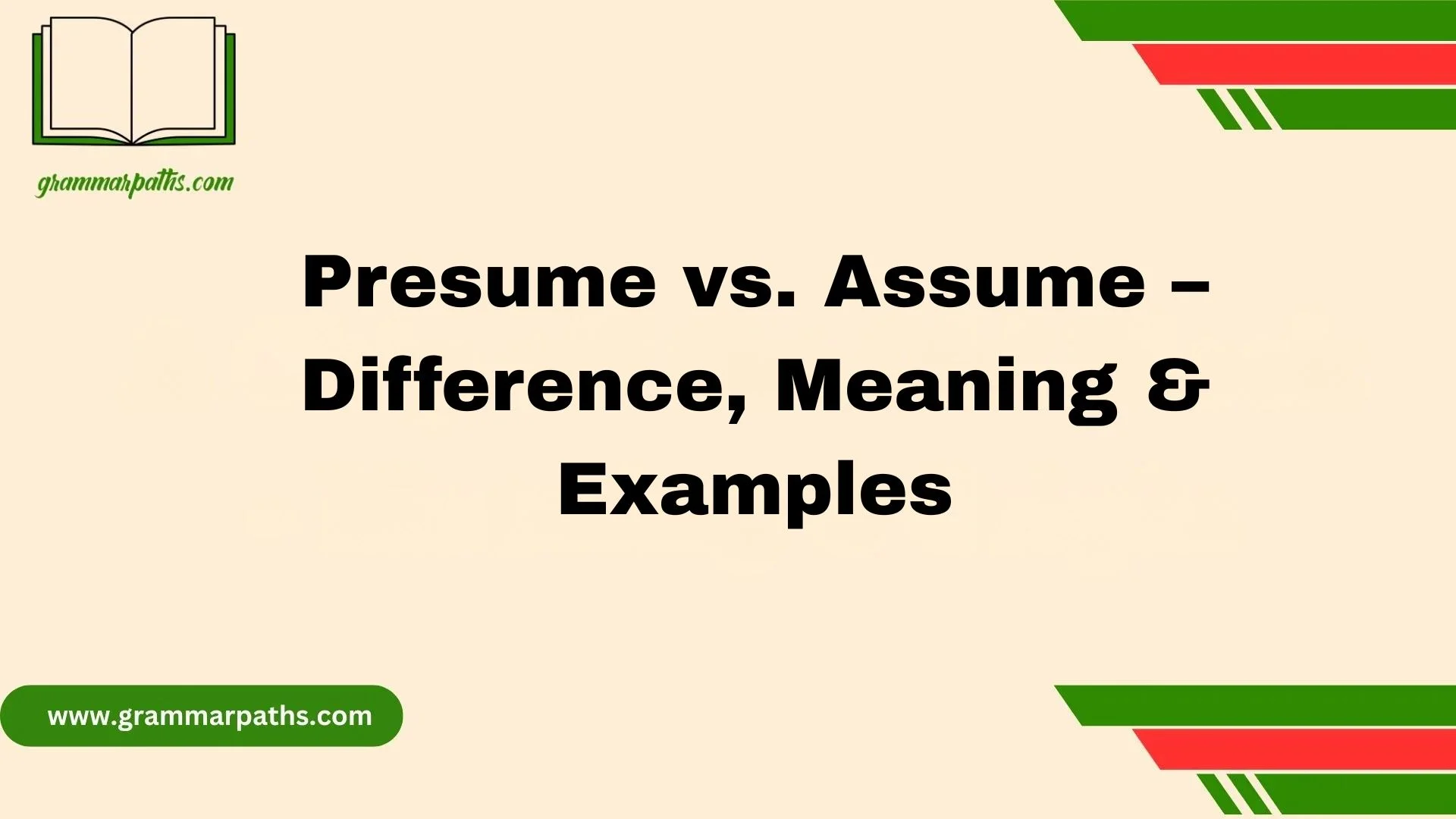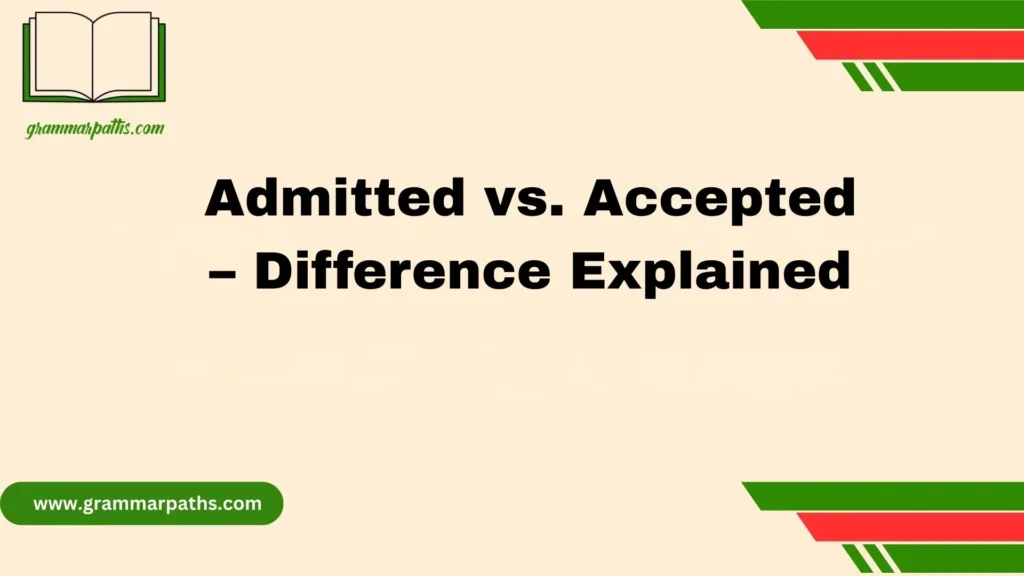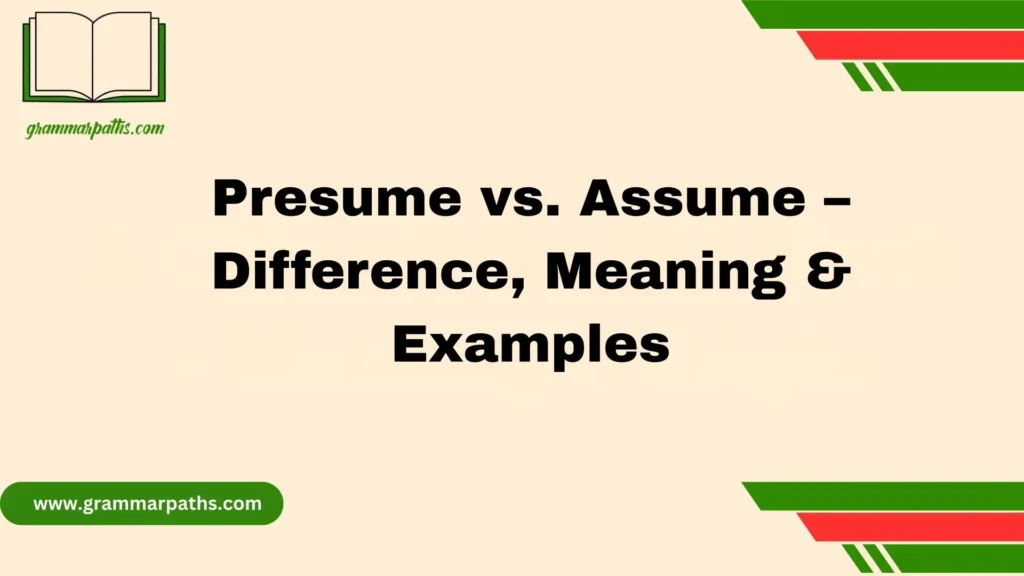When it comes to the English language, people often confuse the words presume and assume, thinking they can be used interchangeably. While they appear similar, there are subtle differences in their meaning, usage, and context. Understanding the contrast between presume vs. assume can improve clarity in both writing and speaking.
The word assume typically means to suppose something without proof. It’s often based on limited facts or even no evidence at all. For example, one might say, “I assume he is late because of traffic.” Here, the speaker has no clear proof but makes a guess. On the other hand, presume implies a stronger belief that is based on probability or reasonable evidence. For instance, “We presume the store is closed because the lights are off.” In this case, there is a logical basis behind the belief.
In legal, academic, and everyday contexts, the distinction between presume vs. assume becomes important. Knowing when to assume versus when to presume helps avoid misunderstandings and ensures precise communication. This subtle difference can shape the way a message is interpreted, making it crucial for learners and professionals alike.
What Does Assume Mean?
Definition
The verb assume means to take something as true without proof or to suppose a fact without evidence. It often suggests a guess, expectation, or belief that isn’t backed by concrete data.
Oxford English Dictionary: Assume means to suppose something to be the case, without proof.
Etymology and History
The word comes from the Latin assumere, meaning “to take up or adopt.” Over time, it evolved into different shades of meaning, including:
- To take responsibility (“She assumed control of the company”)
- To take on a role or position (“He assumed the role of leader”)
- To believe something without evidence (“I assumed you’d call me back”)
Today, it most often carries the sense of making a guess or forming an opinion without certainty.
Usage in Modern English
- Casual conversations: “I assumed you’d be late because of traffic.”
- Business: “We assumed the project would take six weeks.”
- Academics/Science: “Assume that X = 10 for the purpose of this equation.”
- Social context: “Don’t assume someone’s feelings before asking them.”
Example Sentences Using Assume
- I assumed you already knew about the meeting.
- Let’s assume the worst and prepare accordingly.
- She assumed leadership when the manager resigned.
- In algebra, we often assume values to test equations.
What Does Presume Mean?
Definition
The verb presume means to suppose something is true based on evidence, probability, or reasonable grounds. Unlike assume, it carries more weight and often implies confidence.
Merriam-Webster: Presume means to suppose something is true based on probability.
Etymology and History
The word comes from the Latin praesumere, meaning “to take beforehand” or “to anticipate.” Its earliest uses in English date back to the 14th century, especially in law and philosophy.
Over time, presume has retained its sense of acting on a belief that has some foundation in fact or evidence.
Usage in Modern English
- Legal context: “A defendant is presumed innocent until proven guilty.”
- Formal writing: “We presume the study’s results will be consistent with past data.”
- Everyday context: “I presume you’re hungry after your long flight.”
Example Sentences Using Presume
- The law presumes innocence until evidence proves guilt.
- I presume you’ll want some coffee after that meeting.
- Scientists presume that climate change will intensify weather patterns.
- We presumed he was the expert because of his credentials.
Key Similarities Between Assume and Presume
Although they’re different, assume and presume overlap in meaning because both involve accepting something as true without absolute proof.
Here are the main similarities:
- Both are verbs that deal with beliefs or expectations.
- Both can apply to everyday speech and professional contexts.
- Both can lead to misunderstandings if used carelessly.
Table: Overlap in Meaning
| Feature | Assume | Presume |
| Core idea | Accept without full proof | Accept without full proof |
| Contexts | Informal & formal | Mostly formal & legal |
| Common link | Both mean “to suppose” | Both suggest belief or opinion |
Core Differences Between Presume vs. Assume
This is where the real distinction shines.
Level of Certainty
- Assume = Guess without evidence.
- Presume = Inference based on probability or facts.
Tone and Formality
- Assume is common in casual, everyday speech.
- Presume is formal, professional, and legal.
Contexts
- Assume often shows up in science, math, or daily talk.
- Presume is favored in law, academia, and formal communication.
Comparison Table: Assume vs. Presume
| Aspect | Assume | Presume |
| Definition | Believe without evidence | Believe based on evidence/prob. |
| Certainty | Low | High |
| Formality | Casual & academic | Formal & legal |
| Example | “I assumed you’d text me.” | “The law presumes innocence.” |
Common Mistakes and Misconceptions
People often blur the lines between the two. Here are pitfalls to avoid:
- Using “assume” in legal writing: Saying “the court assumes innocence” is wrong; it’s “presumes innocence.”
- Overusing “presume” casually: “I presume you like pizza” sounds stiff in everyday talk.
- Assuming equals presuming: They are not interchangeable in formal contexts.
Pro Tip: If you’re unsure, use assume in casual talk and presume in formal/legal contexts.
Practical Examples in Different Contexts
Business
- Assume: “We assumed revenue would increase.”
- Presume: “The board presumed compliance with regulations.”
Law
- Assume: rarely appropriate.
- Presume: “Every citizen is presumed innocent.”
Science & Academia
- Assume: “Assume variable X equals 100.”
- Presume: “Researchers presumed results would match the hypothesis.”
Everyday Speech
- Assume: “I assumed you’d bring dessert.”
- Presume: “I presume you’ve met my colleague.”
Memory Tricks to Tell Them Apart
- Presume = Probability. If there’s evidence, you presume.
- Assume = Absent evidence. If you’re guessing, you assume.
- Visual analogy: Imagine a courtroom. A lawyer presumes innocence with evidence. A friend assumes you’ll bring snacks without asking.
Case Study: Assume vs. Presume in Law
Few fields highlight this difference better than law.
- Presumption of Innocence: In U.S. law, a person is presumed innocent until proven guilty. That presumption is based on a fundamental legal principle, not just a casual belief.
- Assumption of Risk: In contract or tort law, “assumption of risk” refers to voluntarily accepting a known danger. Here, assume is correct, because it means someone takes responsibility without needing proof.
Real Example:
- Presume: A jury presumes innocence until evidence is shown.
- Assume: An athlete assumes the risk of injury when playing football.
This shows how critical it is to use the right verb in legal settings.
Conclusion
The distinction between presume vs. assume is subtle but significant. While both words involve forming a belief, their contexts and levels of certainty differ. Assume is often used when making a guess without proof, while presume suggests a belief supported by evidence, logic, or probability. Recognizing this difference helps improve both spoken and written communication, making your language more precise and professional. Whether you’re writing an essay, speaking in a business setting, or interpreting legal texts, knowing when to use assume and when to use presume can prevent misunderstandings and convey your ideas more clearly.
FAQs
Q1: What is the main difference between presume and assume?
The main difference is that assume is guessing without proof, while presume is believing something likely based on evidence.
Q2: Can I use assume instead of presume?
Not always. In casual speech, people mix them up, but in formal or legal contexts, the difference matters.
Q3: Is presume more formal than assume?
Yes, presume is more formal and is commonly used in legal, academic, or professional settings.
Q4: Which word should I use in daily conversations?
In everyday speech, people usually say assume, but using presume in the right context makes your language sound clearer and more accurate.
Q5: Why should I learn the difference?
Because it improves communication skills, avoids confusion, and ensures you use the right word in both casual and formal situations.

Emma Brooke is a passionate language expert and contributor at GrammarPaths.com, where she helps learners navigate the complexities of English grammar, idioms, and effective writing. With a strong academic background and years of teaching experience, Emma excels at turning tricky grammar rules into simple, practical lessons that readers can easily grasp.












